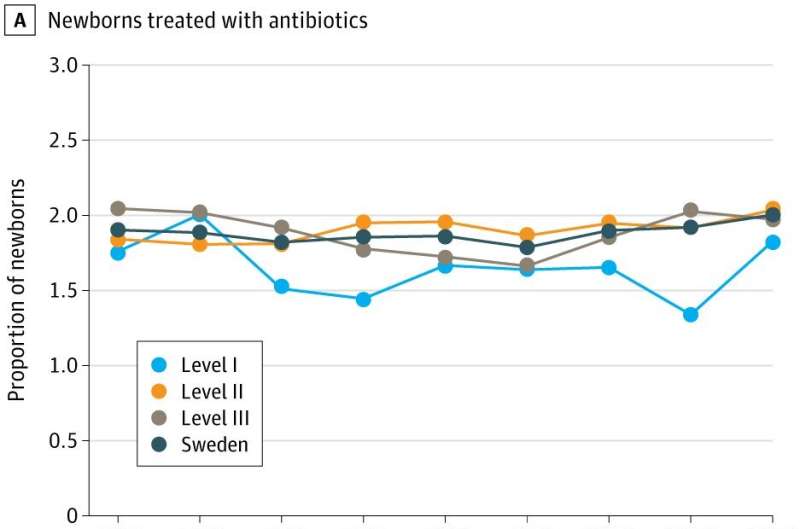This article has been reviewed according to Science X's editorial process and policies. Editors have highlighted the following attributes while ensuring the content's credibility:
fact-checked
peer-reviewed publication
trusted source
proofread
Study highlights overuse of antibiotics in newborns with suspected sepsis

Newborns in Sweden are given antibiotics for suspected sepsis to an unjustified extent. This is according to a study by the University of Gothenburg in more than 1 million newborns. Despite a significant reduction in sepsis rate in the group, the use of antibiotics has not decreased.
The study
is published in the journal JAMA Network Open and is based on data on newborns in Sweden from 2012 to 2020. The study covers more than 1 million newborns with a gestational age greater than or equal to 34 weeks. It should be highlighted that the study demonstrates relatively low
However, the researchers argue that the level of treatment is still unjustifiably high. Despite the incidence of sepsis in newborns in Sweden during the study period was halved, there was no significant change in antibiotic use.
Potential to reduce
Johan Gyllensvärd is a Ph.D. student at Sahlgrenska Academy at the University of Gothenburg, a Pediatrician at Ryhov County Hospital in Jönköping and one of the driving forces behind the study.
"The findings suggest that a large number of newborns are treated with antibiotics without having sepsis and that there is potential to reduce antibiotic use. The treatment burden is too high compared to the number of cases and mortality rates from sepsis," he says.
In the basis material with data from more than 1 million newborns, 647 cases of early-onset sepsis were recorded, 9 of which were fatal. This corresponds to 0.63 cases of sepsis per 1,000 newborns annually. During the study period from 2012 to 2020, the rate fell from 0.74 to 0.34 cases per 1,000 newborns annually.
An important balancing act
Sepsis, sometimes called blood poisoning, is a potentially life-threatening condition caused by the immune system's response to an infection. Organs such as the heart, lungs, brain, and kidneys can be affected, and treatment must be started immediately.
Antibiotics, on the other hand, disrupt the normal bacterial flora, which is sensitive in newborns and especially in premature babies. The overuse of antibiotics also increases the risk of becoming a carrier of antibiotic-resistant bacteria.
"What could potentially reduce unnecessary antibiotic use is a continuous screening of newborns with risk factors for infection but without symptoms. In cases of suspected sepsis, the period with antibiotic treatment can be shortened if the suspicion is significantly reduced and blood cultures remain negative," says Johan Gyllensvärd.
"Guidelines for antibiotic use in newborns need to be continuously evaluated to optimize the balance between effective sepsis care and minimizing unnecessary antibiotic treatment to improve long-term health," he concludes.
More information: Johan Gyllensvärd et al, Antibiotic Use in Late Preterm and Full-Term Newborns, JAMA Network Open (2024). DOI: 10.1001/jamanetworkopen.2024.3362



















